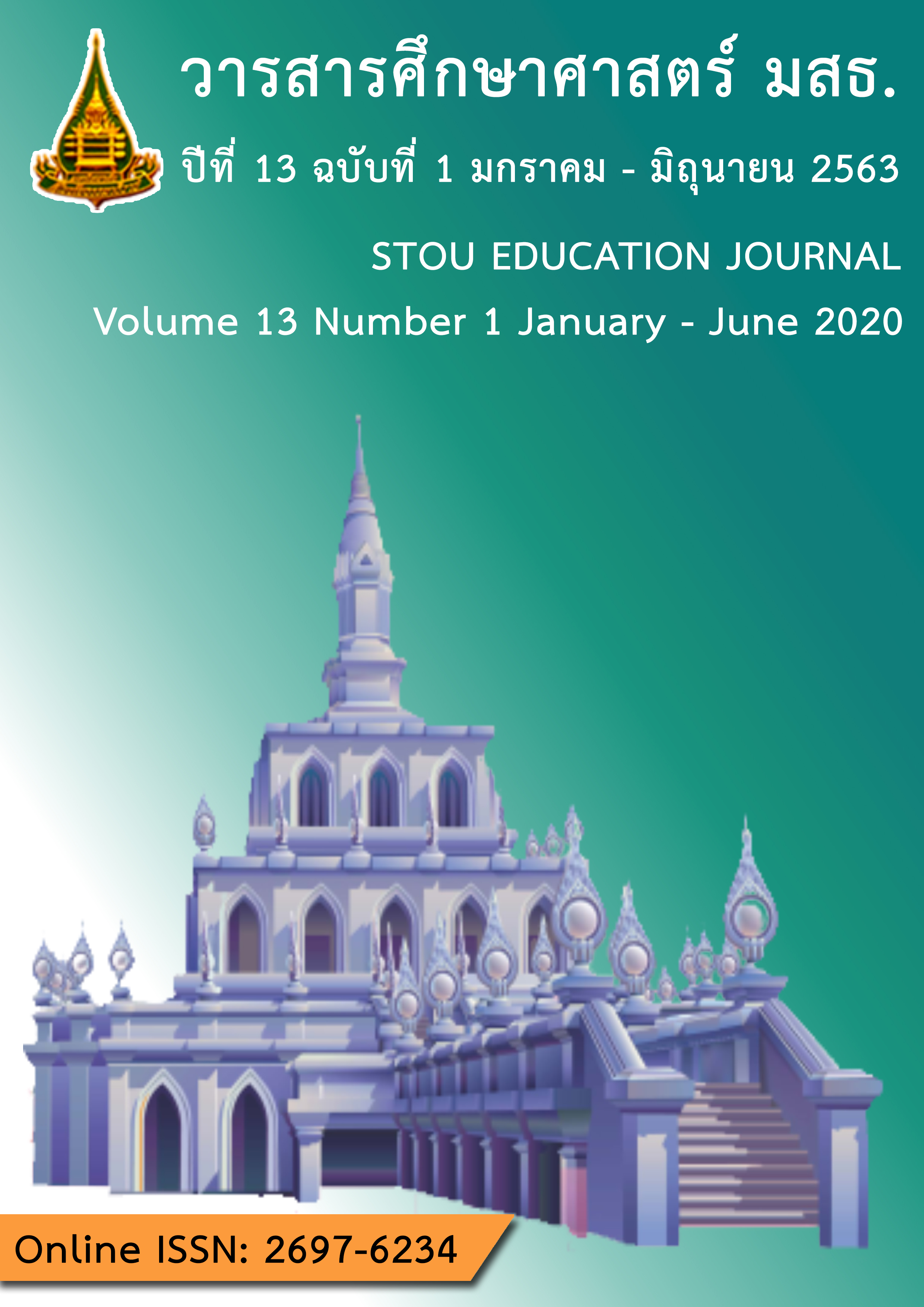ผลของการใช้แชทบอทที่มีการช่วยเสริมศักยภาพการเรียนรู้ออนไลน์ที่มีต่อการคิดเชิงคำนวณของนักเรียนระดับชั้นมัธยมศึกษาปีที่ 4 ที่มีบุคลิกภาพที่แตกต่างกัน
Main Article Content
บทคัดย่อ
การวิจัยนี้มีวัตถุประสงค์เพื่อศึกษาผลของการใช้แชทบอทที่มีการช่วยเสริมศักยภาพการเรียนรู้ออนไลน์ที่มีต่อการคิดเชิงคำนวณของนักเรียนที่มีบุคลิกภาพที่แตกต่างกัน กลุ่มตัวอย่างที่ใช้ในการวิจัย คือ นักเรียนระดับชั้นมัธยมศึกษาปีที่ 4 ที่มีบุคลิกภาพแบบเปิดเผยและบุคลิกภาพแบบเก็บตัว และกำลังเรียนในรายวิชาพื้นฐานวิทยาศาสตร์ เทคโนโลยี วิชาวิทยาการคำนวณ จำนวน 60 คน ได้มาด้วยวิธีการสุ่มแบบแบ่งชั้น เครื่องมือที่ใช้ในการวิจัย ได้แก่ 1) แบบวัดบุคลิกภาพ 2) บทเรียนผ่านแชทบอท 3) แบบวัดการคิดเชิงคำนวณก่อนและหลังเรียน สถิตที่ใช้ในการวิเคราะห์ข้อมูล ได้แก่ ร้อยละ ค่าเฉลี่ย ส่วนเบี่ยงเบนมาตรฐาน และการทดสอบค่าที ผลการวิจัย พบว่า 1) นักเรียนที่มีบุคลิกภาพแบบเปิดเผยและบุคลิกภาพแบบเก็บตัว ทั้งสองกลุ่มมีคะแนนเฉลี่ยการคิดเชิงคำนวณหลังการทดลองสูงกว่าก่อนการทดลอง อย่างมีนัยสำคัญทางสถิติที่ระดับ .05 2) การใช้แชทบอทที่มีการช่วยเสริมศักยภาพการเรียนรู้ออนไลน์ที่มีต่อการคิดเชิงคำนวณหลังการทดลองของนักเรียนที่มีบุคลิกภาพแบบเปิดเผยสูงกว่านักเรียนที่มีบุคลิกภาพแบบเก็บตัว อย่างมีนัยสำคัญทางสถิติที่ระดับ .05 และ 3) นักเรียนที่มีบุคลิกภาพแบบเก็บตัวมีค่าเฉลี่ยการใช้งานแชทบอทส่วนการใช้งานเว็บไซต์สูงกว่านักเรียนที่มีบุคลิกภาพแบบเปิดเผย อย่างมีนัยสำคัญทางสถิติที่ระดับ .05
Article Details
เอกสารอ้างอิง
กระทรวงศึกษาธิการ. (2560). มาตรฐานการเรียนรู้และตัวชี้วัด กลุ่มสาระการเรียนรู้คณิตศาสตร์ วิทยาศาสตร์ และสาระภูมิศาสตร์ ใน กลุ่มสาระการเรียนรู้สังคมศึกษา ศาสนา และวัฒนธรรม (ฉบับปรับปรุง พ.ศ. 2560) ตามหลักสูตรแกนกลางการศึกษาขั้นพื้นฐาน พุทธศักราช 2551. กรุงเทพมหานคร: โรงพิมพ์ชุมนุมสหกรณ์การเกษตรแห่งประเทศไทย จำกัด.
กวี ศรีเวศร. (2544). วิธีวัดค่าบุคลิกภาพและเชาวน์อารมณ์ EQ. กรุงเทพมหานคร : เอ็กซเปอร์เน็ท.
ทองจันทร์ เติมจิตร. (2561, 20 พฤษภาคม) สัมภาษณ์โดยศิรัฐ อิ่มแช่ม [บันทึกเสียง] สถานที่สัมภาษณ์โรงเรียนในเขตกรุงเทพมหานคร สังกัดสำนักงานคณะกรรมการการศึกษาขั้นพื้นฐาน.
พัสธร สุวรรณศรี. (2560). Intent-Based vs. Flow-Based Conversation. สืบค้นจาก https://medium.com/hbot/intent-based-vs-flow-based-conversation-e0f7551e674b
ยืน ภู่วรวรรณ. (2561). วิทยาการคำนวณ คืออะไร? วิชาบังคับพื้นฐานใหม่ล่าสุดสำหรับเด็ก พร้อมบทสัมภาษณ์จากผู้ก่อตั้ง. สือค้นจาก https://school.dek-d.com/blog/?p=656
ศศิวรรณ ชำนิยนต์. (2552). ผลของการเรียนแบบใช้ปัญหาเป็นหลักบนเว็บช่วยเสริมศักยภาพที่แตกต่างกันที่มีต่อผลสัมฤทธิ์ทางการเรียนวิชาวิทยาศาสตร์ของนักเรียนมัธยมศึกษาปีที่ 3. (วิทยานิพนธ์ครุศาสตรมหาบัณฑิต ไม่ได้ตีพิมพ์). จุฬาลงกรณ์มหาวิทยาลัย, กรุงเทพมหานคร.
สุธีระ ประเสริฐสรรพ์. (2559). ถอดรหัสการสอนสะเต็ม (พิมพ์ครั้งที่ 1). กรุงเทพมหานคร: นําศิลป์โฆษณา จํากัด.
Cattel, R., Eber, H., & Tatsuoka, M. (1970). Handbook for the sixteen personality questionaire (16PF). IL: Institute for Personality and Ability Testing.
Davis, E. A. (1996). Metacognitive scaffolding to foster scientific explanations. Paper presented at the Annual Meeting of The American Educational Research Association, New York.
McLoughlin, C. (2002). Learner Support in Distance and Networked Learning Environments: Ten Dimensions for Successful Design. Distance Education, 23(2), 149-162. doi:10.1080/0158791022000009178.
Wing, J. M. (2006). Computational thinking. Communications of the ACM, 49(3), 33-35.


